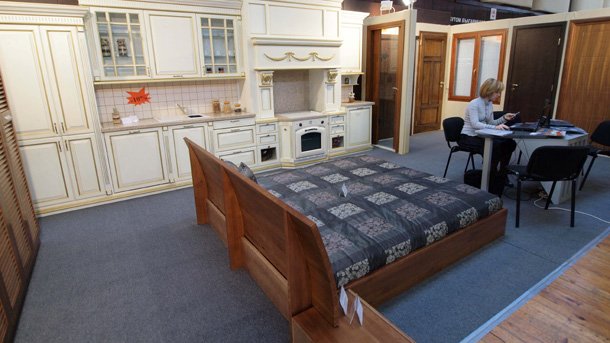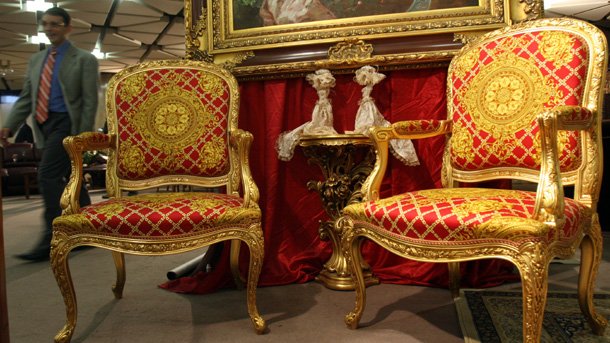The construction boom in Bulgaria before the global financial crisis gave a boost also to supporting industries such as the furniture industry. The good profits made some companies forget that economy goes through good and bad times. With the start of the crisis in Bulgaria in early 2009, construction sharply decreased. The negative impact was clearly felt by companies in woodworking and furniture production. Only few of them made a reasonable assessment of the future and secured stable markets abroad, relying on quality and innovation. Today, firms operating in the Bulgarian furniture industry are just over 500 with officially 4,000 registered companies. The sector has started to feel the competition from large European chains that have entered the Bulgarian market.
Quality and innovation have become the guiding principles of some 20 Bulgarian companies that are members of the Bulgarian Furniture Cluster. "We united our resources and efforts in order to enter the European market with its 500 million consumers," says Genoveva Hristova, president of the union of companies, and tells us more about the secret of successful market penetration.

© Photo: BGNES

© Photo: www.dnevnik.bg
"The organization includes companies that set new standards and models of work in the furniture industry, Genoveva Hristova explains. In order to survive on the external markets, we must have good-quality products, otherwise our place will soon be taken by someone else. We are a group of 22 furniture companies, and I would say elite companies in terms of new approaches and thinking and, of course, in terms of offering high-quality products. The group comprises also 5 design studios and 2 non-governmental organizations, including the Association of Designers in Bulgaria, and specialized universities such as the Italian Institute of Design in Florence."
In 2010, the cluster had a turnover of € 50 million and its economic growth for the first six months of this year is some 12 per cent. This is due to the introduction of information technologies that optimize the business process. For the past five years, the furniture companies have provided furnishings for 52 hotels, business centers in Hanover and Cologne in Germany, the offices of Peugeot in France and a new order has now been placed by Citroen. The companies will also participate in the tender procedure for furnishing 6,000 rooms in the Olympic Village in Sochi. The key partners of the Bulgarian producers are Germany with 70 percent of the markets, and France - with 20 percent. Bulgarian furniture is also purchased by customers in Finland, Britain, Serbia, and Ukraine. "Europe knows us because we have potential, we offer quality and good prices," Genoveva Hristova says. This is why Western European markets have shifted their interest from the Czech Republic, Poland and Hungary to Bulgarian furniture manufacturers.

© Photo: BGNES
Where is the market niche of Bulgarian producers – does it lie in mass production or in limited boutique series? Bulgaria is famous as a country where natural wood furniture has very good traditions. Bulgarian forests produce enough timber to cover a large market, including the timber obtained from certified forests in central and southwestern Bulgaria. Production through environmental protection - this is the future of the furniture industry. Henceforth, it is up to manufacturers to find the right balance between contemporary design, quality, and price.
Anelia Kassabova, vice president of the cluster of furniture companies, adds:
"Considering the European market, Bulgarian furniture made from eco materials will be of huge interest to consumers in the future. And here we are not talking about fiberboard (wood chips glued together with adhesives), which is a widely used material. There are European countries that are much more competitive than us using fiberboard. We have a lot of traditions in the use of solid wood and veneers, which are increasingly sought after. Since last year, there has been a growing interest in eco materials. The collections of furniture which we show at international exhibitions - in London last year, this year in Milan - are made of entirely natural materials. "
The arrival in Bulgaria of large furniture retailers enhances the competitive element of the market, it is being restructured and prices are regulated. The presence of European manufacturers provokes Bulgarian producers to start thinking strategically and demonstrate their advantages. Moreover, one of Europe's largest furniture retailers is to open its first shop in Bulgaria these days. However, it will satisfy the taste mostly of mass consumers. When there is some specificity in the desired piece of furniture, consumers would rather rely on the proven ability of Bulgarian manufacturers.
Translated by: Rossitsa Petcova
The highest average salary in Bulgaria is in Sofia - 1732 euro, and the lowest in Smolyan - 826 euro. These are the data from the National Statistical Institute (NSI) for December 2024. Because of the salaries in the capital, the average salary in..
Monthly inflation in the country was 2% in January and annual inflation was 3.7%. This is according to preliminary data from the National Statistical Institute (NSI). The biggest increases were in the prices of heating and utilities. According to the..
One of the largest Bulgarian companies for repairing civil aviation aircraft has chosen Burgas for a major investment in aircraft repair and maintenance, the Municipality of Burgas announced. The company will build one of the largest hangar complexes..
The highest average salary in Bulgaria is in Sofia - 1732 euro, and the lowest in Smolyan - 826 euro. These are the data from the National Statistical..
Monthly inflation in the country was 2% in January and annual inflation was 3.7%. This is according to preliminary data from the National Statistical..

+359 2 9336 661
